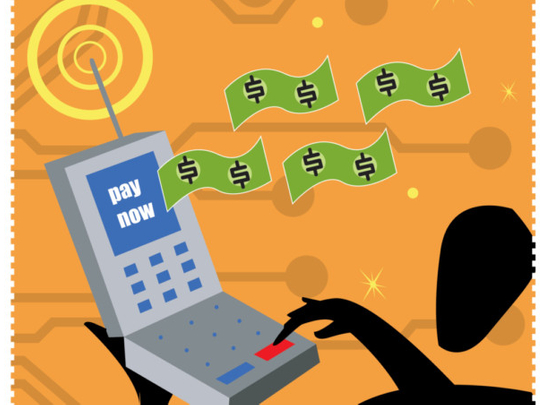
He calls it a point of interaction instead of a point of sales. He is the keeper of payment major MasterCard’s dream of turning every connected device into a commerce device. And it starts with your mobile. Garry Lyons, Chief Innovation Officer and Head of MasterCard Labs, does pretty much all his shopping from a mobile phone. At least it would seem that way from the demo at the recently concluded Cards and Payments Middle East.
Via his mobile MasterPass, a branded digital wallet connected to the MasterPass Acceptance Network, Lyons buys his breakfast — a healthy muffin, Coke Zero, skinny latte et al — in the morning from a coffee shop in Dublin. He orders his daughter’s school cafeteria lunch via Qkr!, which is aiming to displace 100 million cash transactions in Australia if parents take to the app, which allows users to order and pay for products from Qkr!-enabled merchants directly from Android and iOS smartphones and tablet devices. His mobile phone camera helps him scan photos in a magazine ad and using image recognition shop instantly for a watch worth thousands, to be delivered in the US.
Watching baseball on his iPad, Lyons zeroes in on not the old-fashioned home run but on what the player is wearing. “I can buy his cap, his jersey, his PS3 game. I can buy from this,” he says, homing in on a pizza advert to order Al Pizza from stadium advertising.
Even if it is more of a mishmash at the moment, with Near Field Communication (NFC), banks, governments, merchants and mobile service providers scrambling to be on the same page at the same time, the word that you are looking for is convergence — and it is coming soon to a device in your pocket. Call it a digital wallet or a mobile wallet, your phone can be the bearer of all your credit, debit and loyalty cards and provide one seamless experience each time you shop.
The UAE Banks Federation has been working on a mobile wallet project as part of the Dubai Smart Government initiative since February. In some cases, it is already here. In Dubai, early adopters are flashing the Mashreq-issued NFC-enabled Tap N’ Go credit card stickers on their phones, which are good for transactions below Dh100.
Aref Al Ramli, Head of Electronic Business Innovation, Mashreq, tells GN Focus: “We launched our Tap N’ Go product last month and the uptake has been quite good. This is not a core product. It’s a supplementary card, a sticker card that you can use with your mobile phone. You can apply for it if you have any of the core Mashreq products. It allows you to make transactions of less than Dh100 without a signature.” Ramli adds that such is the interest in this space that the company’s investment in mobile and digital technology and innovation has increased by 250 per cent year-on-year.
While mobile wallets are mobile-stored value accounts limited to Dh100 — just like your purse holding cash — newer applications allow more freedom, almost like having your credit cards stored on your phone. MasterCard is already working with banks and merchants in the UAE to bring them on board, and consumers are likely to be able to use such applications this year.
Aaron Oliver, MasterCard’s Emerging Payments Lead MEA, tells GN Focus: “If a consumer sees a MasterPass button on a merchant’s website, it tells them that they can access their cards when they click that button. It goes to the user’s personal digital wallet. The great thing about it is that as issuers bring their accounts online, they give you a card that automatically goes into your digital address.”
Lyons says many of these innovations are possible because mobile phone operating systems work on an open platform on which developers can build tools, whether to do with commerce, fitness or GPS, or a combination of all of these.
Experts say payments are evolving so fast that companies can tell, via little beacons installed in stores, which isle you are loitering in, so as to make you offers that you cannot refuse for items on shelves near you.
For the phone-wary, the best thing, says Oliver, is that the technology will come to you. “You must understand that you don’t come to the technology. The technology comes to you. Starting with cash, we moved to electronic payments and now we bring these online and let them buy remotely with airline travel and hotel bookings. Then we bring them into everyday payments with contactless, whether it is on a card or something like a sticker. Then we move on to app payments. Then we bring them into contactless payments on their mobiles. Then we bring together the handset, online and in-person.
“Finally, when someone in front of you taps and pays and you have a contactless card in your hand, that technology will come to you and you will be a contactless user. Don’t worry, we’ll get you there.”
We may as well wait for a time when banks, restaurants and grocery stores will compete over giving us the most advanced phone possible. A smart one, of course.












